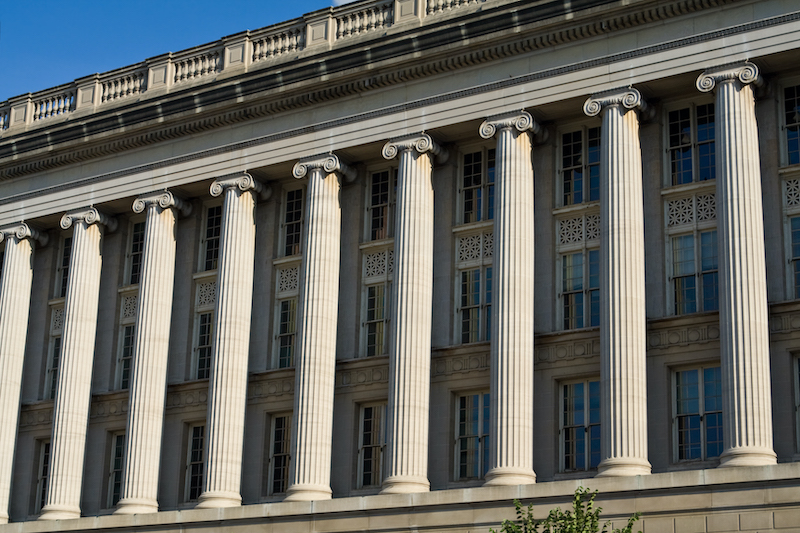
Requiring government institutions to engage in reasoned decision-making mitigates actions made in bad faith.
The extreme political polarization that now infects the nation has placed courts in a difficult situation. Doctrines such as the presumption of regularity, which provides deference to executive branch actors and presumes that they engage in good faith decision-making, seem to be quaint artifacts of a bygone era. In that era, the U.S. Supreme Court characterized bad faith government actions as “rare.” Today, that characterization should be replaced by “frequent.”
Over the past two years, the Supreme Court has identified and applied an approach to judicial review of government actions that is well-tailored to these challenging political circumstances. Under this approach, the Court has reinvigorated, strengthened, and broadened the scope of the duty to engage in reasoned decision-making that the Court described in MVMA v. State Farm in 1983.
Five cases from the last few years illustrate this approach well.
First, in Trump v. Hawaii, decided in 2018, the Court upheld President Donald J. Trump’s ban on travel from six predominantly Muslim countries. The petitioners challenging the travel ban argued that it was not based on national security concerns, but was instead an impermissible application of the animus toward Muslims that President Trump had exhibited throughout his campaign.
At issue in Trump v. Hawaii was the third version of the Administration’s proposed travel ban, which differed from the first two versions in important respects. It was far more qualified than the first two versions and included several exemptions and exclusions that helped support the government’s assertion that the ban was only as broad as national security required. The government also only issued the third ban after conducting a lengthy multi-agency study of the national security implications of allowing travel from nations with large numbers of terrorists and inadequate systems for vetting travelers to the United States. Finally, the government supported the ban with a lengthy report, in which the agencies that conducted the study explained why they recommended the ban.
Ultimately, the Court upheld the ban based on the government’s evidence that these travel restrictions reflected a good faith application of national security considerations, concluding that the ban was “expressly premised on legitimate purposes.” But importantly, over the objections of the government, the Court explicitly considered the powerful evidence the petitioners offered to support their argument, including President Trump’s campaign speeches.
The Court’s opinion in Trump v. Hawaii sent the clear message to government institutions that the Court would take claims of bad faith seriously when they were supported by powerful and particularized evidence. In all such cases, the Court would engage in detailed review of the evidence that the government presented and would examine whether governmental action was a product of reasoned decision-making.
Second, in Department of Commerce v. New York, the Court last year rejected the U.S. Department of Commerce’s attempt to add a citizenship question to the 2020 census questionnaire. The Court held that the Commerce Department has the power to include such a question on the census, but that the Department had not adequately explained why such a question should be included.
Secretary of Commerce Wilbur Ross had claimed that the Commerce Department added the question at the behest of the U.S. Department of Justice, because the citizenship question would provide information that would assist the Justice Department in its efforts to enforce the Voting Rights Act. The government produced no evidence to support that claim, however. In fact, evidence emerged that strongly suggested that the Commence Department sought to add the citizenship question at the request of the Republican Party based on the party’s belief that adding such a question would deter undocumented immigrants from responding to the census. Because responses to the census are used to draw congressional districts, adding the Administration’s proposed question would therefore reduce the number of congressional seats held by Democrats and increase the number of seats held by Republicans.
Like the Trump v. Hawaii opinion, the opinion in the census case sent a clear and powerful message. “We are presented, in other words, with an explanation for agency action that is incongruent with what the record reveals about the agency’s priorities and decision-making process,” Chief Justice John Roberts wrote. “The reasoned explanation requirement of administrative law,” he explained, “is meant to ensure that agencies offer genuine justifications for important decisions…Accepting contrived reasons would defeat the purpose of the enterprise.”
Third, in Department of Homeland Security v. Regents of the University of California, the Court this term rejected the government’s attempt to rescind the Deferred Action for Childhood Arrivals (DACA) program. Like the opinions in the travel ban and census cases, the opinion in the DACA case is all about the duty to engage in reasoned decision-making.
The Court held that the government could rescind the DACA policy only if it provided adequate reasoning to support its action. Notably, the Chief Justice emphasized the consideration of reliance interests, adding another requirement to the duty to engage in reasoned decision-making: When an agency takes action that interferes with expectations created by a prior action, the agency must consider explicitly the adverse effects that the rescission of a prior action has on settled expectations. An agency must also explain why the rescission is justified given those adverse effects.
In the travel ban, census, and DACA cases, the Court sent two clear messages to the executive branch. First, the Court will take seriously any well-supported claim that an agency or government actor took action in bad faith, and, second, the Court will require the government to provide an adequate, genuine explanation for any action it takes. In the two final cases that the Court decided this term, it broadened the scope of those two messages, applying these principles both to the U.S. Congress and to prosecutors.
In Trump v. Mazars, the Court refused to enforce a subpoena issued by the U.S. House of Representatives to obtain documents from the President. Although the majority noted that Congress’s power to require the President to hand over documents in response to a subpoena is “indispensable,” the Court qualified that power in several respects. Congress must explain with specificity why it needs the documents for a legitimate legislative purpose, why it cannot obtain comparable information from alternative sources, and why its demand does not impose an undue burden on the President.
Finally, in Trump v. Vance, the Court held that a state prosecutor acting on behalf of a grand jury can subpoena records of the President. As in the context of agency action and subpoenas issued by Congress, however, the Court conditioned the exercise of the subpoena power on the prosecutor’s ability to satisfy a duty to engage in reasoned decision-making. A federal court can intervene in a state grand jury proceeding to assure that any attempt to obtain information by subpoena is not motivated by or conducted in bad faith, as well as to preclude a prosecutor from imposing an undue burden on the President.
In the years ahead, the Court will continue to encounter serious problems in its efforts to keep the institutions of government within appropriate legal boundaries, given the conditions of extreme political polarity that the United States is now experiencing. So far, however, the Court has done an excellent job of identifying, strengthening, and broadening the scope of a doctrine that is well-suited to this task. By requiring all government institutions to provide adequate reasoning in support of any action they take, the Court has made it more difficult for agencies, Congress, and prosecutors to take actions in bad faith that are motivated only by partisan political goals or legally impermissible goals.
This essay is part of a series entitled The Supreme Court’s 2019-2020 Regulatory Term.




